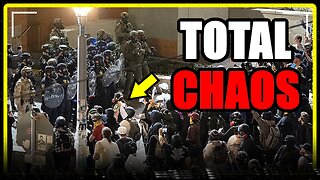Premium Only Content

Child Trafficking is a Grave and Complex Issue that Affects the WORLD
Child trafficking is a grave and complex issue that affects many countries and regions, including Africa. It is important to note that child trafficking is not specific to Africa, but it is a global problem. Several factors contribute to the prevalence of child trafficking in Africa, as well as in other parts of the world. Some of these factors include:Poverty: Poverty is a significant driver of child trafficking. Families living in poverty may be more vulnerable to traffickers who promise them better opportunities for their children, such as education or employment, in exchange for their children.
Lack of Education: In many African countries, limited access to quality education can lead to a lack of awareness and understanding of the risks associated with child trafficking. Children and their families may be more easily deceived by traffickers offering education or scholarships.
Conflict and Instability: Regions experiencing conflict, political instability, or natural disasters are often hotspots for child trafficking. Displaced families and children are particularly vulnerable to exploitation during such crises.
Weak Law Enforcement: Inadequate law enforcement, corruption, and limited resources can hinder efforts to combat child trafficking. Traffickers may operate with relative impunity in areas with weak governance.
Cultural Practices: Certain cultural practices, such as child marriage and child labor, can contribute to the vulnerability of children to trafficking. These practices may be deeply ingrained in some societies.
Demand for Cheap Labor and Exploitation: The demand for cheap labor, particularly in sectors like agriculture, mining, and domestic work, creates opportunities for traffickers to exploit children who are forced to work under exploitative conditions.
Lack of Birth Registration: The absence of proper birth registration systems can make it easier for traffickers to use children with no legal identity.
Migration: Migration, both within and across borders, can expose children to trafficking risks, as they may be separated from their families and support networks.Lack of Awareness: Limited awareness about the dangers of child trafficking and the rights of children can make it difficult for individuals and communities to identify and prevent trafficking incidents.Efforts to combat child trafficking in Africa and around the world involve a combination of legislative measures, law enforcement actions, awareness campaigns, and support for vulnerable communities. International organizations, governments, and NGOs work together to address the root causes and consequences of child trafficking and to provide protection and assistance to victims. It's crucial to tackle child trafficking comprehensively and collaboratively to effectively reduce its prevalence.certain regions have been identified as hotspots for child trafficking due to various factors such as poverty, conflict, and weak law enforcement. These regions include:Sub-Saharan Africa: This region faces significant challenges related to child trafficking, including forced child labor, child soldier recruitment, and child marriage. Countries in West and Central Africa, in particular, have high rates of child trafficking.South Asia: Countries in South Asia, such as India, Nepal, and Bangladesh, also experience high rates of child trafficking, often involving forced labor, sexual exploitation, and child marriage.Southeast Asia: Southeast Asian countries, including Thailand, Cambodia, and Myanmar, have been known for child trafficking, particularly in the context of the sex trade and forced labor.Central and South America: Some countries in Central and South America, such as Brazil and Haiti, face challenges related to child trafficking, including child labor, child exploitation in the sex industry, and trafficking for forced labor.organizations that work to combat child trafficking Some of the most well-known organizations include:
UNICEF (United Nations Children's Fund): UNICEF works to protect and promote the rights of children globally, including efforts to combat child trafficking, child exploitation, and child labor.ILO (International Labour Organization): The ILO focuses on eradicating child labor and promoting decent work for all, including measures to prevent child trafficking for labor exploitation.ECPAT (End Child Prostitution, Child Pornography, and Trafficking of Children for Sexual Purposes): ECPAT is a global network of organizations dedicated to ending the sexual exploitation of children, including child trafficking for sexual purposes.
-
 1:27
1:27
420 VGT LIVE 5.0
1 year agoFormer Illinois Republican Rep. Mike Boast lost his temper
1471 -
 4:44:53
4:44:53
MattMorseTV
10 hours ago $219.38 earned🔴Antifa action INBOUND.🔴
204K121 -
 2:11:24
2:11:24
Tundra Tactical
13 hours ago $63.56 earnedTundra Nation Live - Tundra's Guns?? We Finally See What Tundra Shoots
48.2K4 -
 2:44:07
2:44:07
BlackDiamondGunsandGear
13 hours agoAFTER HOURS ARMORY / Whiskey & Windage
26.1K2 -
 23:56
23:56
marcushouse
21 hours ago $24.98 earnedStarship Began the Demolition!? 🔥
45.7K6 -
 17:59
17:59
JohnXSantos
1 day ago $6.42 earnedI Gave AI 14 Days to Build NEW $5K/MONTH Clothing Brand
29.4K4 -
 2:44:07
2:44:07
DLDAfterDark
11 hours ago $31.03 earnedGun Talk - Whiskey & Windage - The "Long Range" Jouney - After Hours Armory
33.6K2 -
 9:37
9:37
Film Threat
14 hours agoSHELBY OAKS REVIEW | Film Threat
21.5K10 -
 35:40
35:40
The Mel K Show
9 hours agoMel K & Dr. Mary Talley Bowden MD | Heroes of the Plandemic: Doing What is Right No Matter the Cost | 10-25-25
54K17 -
 3:06:20
3:06:20
FreshandFit
13 hours agoNetworking At Complex Con With DJ Akademiks
218K29